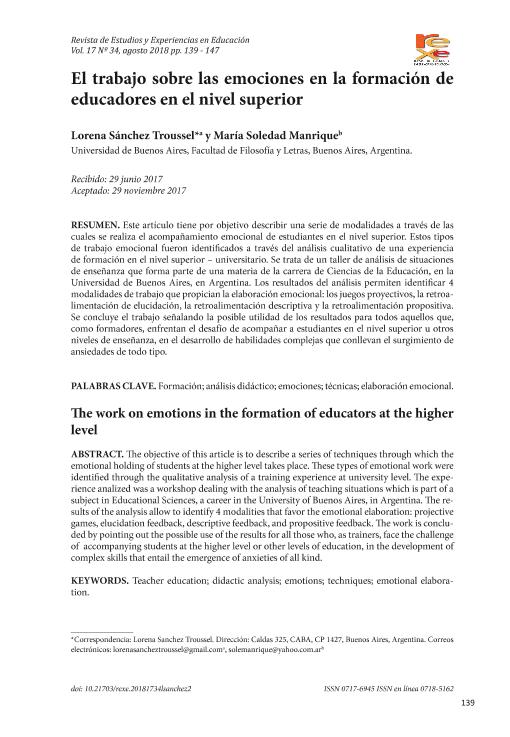Mostrar el registro sencillo del ítem
dc.contributor.author
Manrique, Maria Soledad

dc.date.available
2020-01-15T19:11:33Z
dc.date.issued
2018-08
dc.identifier.citation
Manrique, Maria Soledad; El trabajo sobre las emociones en la formación de educadores en el nivel superior; Universidad Católica de la Santísima Concepción. Facultad de Educación; Revista de Estudios y Experiencias en Educación; 17; 34; 8-2018; 139-147
dc.identifier.issn
0718-5162
dc.identifier.uri
http://hdl.handle.net/11336/94790
dc.description.abstract
Este artículo describe el modo en que se realiza un tipo de trabajo de acompañamiento del devenir emocional de los miembros de un taller que se propone formar a futuros Licenciados en Educación en el análisis didáctico de situaciones de enseñanza. En primer lugar, presentamos algunas de las concepciones teóricas que fundamentan el trabajo en el taller. Realizamos, luego, una descripción de los aspectos técnicos del taller (sus propósitos, la modalidad de trabajo, el tipo de saber en juego) y del modo en que concebimos las emociones. Por último, describimos tres de las técnicas utilizadas para el trabajo sobre las emociones: los juegos proyectivos, la retroalimentación de elucidación y la retroalimentación propositiva. Si bien el trabajo aborda la presencia de las emociones en un taller de análisis didáctico, los aportes aquí mencionados pueden ser de utilidad para quienes, como formadores, enfrentan el desafío de abordar ansiedades vinculadas con el aprendizaje de capacidades complejas en el nivel superior de enseñanza. This article describes the way in which a type of holding of the emotional ?.. of the members of a workshop that intends to train future graduates in Education in the didactic analysis of teaching situations. In the first place, we present some of the theoretical conceptions that base the work in the workshop. We then make a description of the technical aspects of the workshop (its purposes, the mode of work, the type of knowledge at play) and the way in which we conceive emotions. Finally, we describe three of the techniques used for working on emotions: projective games, elucidation feedback and propositional feedback. Although the work addresses the presence of emotions in a didactic analysis workshop, the contributions mentioned here may be useful for those who, as trainers, face the challenge of addressing anxieties related to the learning of complex capacities in the higher level of education.
dc.description.abstract
The objective of this article is to describe a series of techniques through which the emotional holding of students at the higher level takes place. hese types of emotional work were identiied through the qualitative analysis of a training experience at university level. he experience analized was a workshop dealing with the analysis of teaching situations which is part of a subject in Educational Sciences, a career in the University of Buenos Aires, in Argentina. he results of the analysis allow to identify 4 modalities that favor the emotional elaboration: projective games, elucidation feedback, descriptive feedback, and propositive feedback. he work is concluded by pointing out the possible use of the results for all those who, as trainers, face the challenge of accompanying students at the higher level or other levels of education, in the development of complex skills that entail the emergence of anxieties of all kind.
dc.format
application/pdf
dc.language.iso
spa
dc.publisher
Universidad Católica de la Santísima Concepción. Facultad de Educación
dc.rights
info:eu-repo/semantics/openAccess
dc.rights.uri
https://creativecommons.org/licenses/by-nc-sa/2.5/ar/
dc.subject
FORMACIÓN
dc.subject
ANÁLISIS DIDÁCTICO
dc.subject
EMOCIONES
dc.subject
ELABORACIÓN EMOCIONAL
dc.subject.classification
Educación General

dc.subject.classification
Ciencias de la Educación

dc.subject.classification
CIENCIAS SOCIALES

dc.title
El trabajo sobre las emociones en la formación de educadores en el nivel superior
dc.title
The work on emotions in the formation of educators at the higher level
dc.type
info:eu-repo/semantics/article
dc.type
info:ar-repo/semantics/artículo
dc.type
info:eu-repo/semantics/publishedVersion
dc.date.updated
2019-10-15T13:06:48Z
dc.journal.volume
17
dc.journal.number
34
dc.journal.pagination
139-147
dc.journal.pais
Chile

dc.description.fil
Fil: Manrique, Maria Soledad. Consejo Nacional de Investigaciones Científicas y Técnicas; Argentina. Universidad de Buenos Aires. Facultad de Filosofía y Letras; Argentina
dc.journal.title
Revista de Estudios y Experiencias en Educación
dc.relation.alternativeid
info:eu-repo/semantics/altIdentifier/url/http://www.rexe.cl/ojournal/index.php/rexe/article/view/570
Archivos asociados
